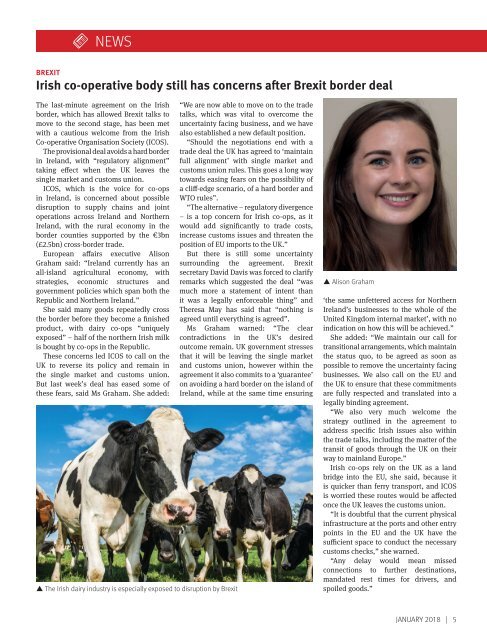JANUARY 2018
The January edition of Co-op News: connecting, challenging and championing the global co-operative movement. This issue explores finding the route to collective decision-making. It also looks at gender equality, co-housing for homeless veterans and what 2018 holds in store.
The January edition of Co-op News: connecting, challenging and championing the global co-operative movement. This issue explores finding the route to collective decision-making. It also looks at gender equality, co-housing for homeless veterans and what 2018 holds in store.
Create successful ePaper yourself
Turn your PDF publications into a flip-book with our unique Google optimized e-Paper software.
NEWS<br />
BREXIT<br />
Irish co-operative body still has concerns after Brexit border deal<br />
The last-minute agreement on the Irish<br />
border, which has allowed Brexit talks to<br />
move to the second stage, has been met<br />
with a cautious welcome from the Irish<br />
Co-operative Organisation Society (ICOS).<br />
The provisional deal avoids a hard border<br />
in Ireland, with “regulatory alignment”<br />
taking effect when the UK leaves the<br />
single market and customs union.<br />
ICOS, which is the voice for co-ops<br />
in Ireland, is concerned about possible<br />
disruption to supply chains and joint<br />
operations across Ireland and Northern<br />
Ireland, with the rural economy in the<br />
border counties supported by the €3bn<br />
(£2.5bn) cross-border trade.<br />
European affairs executive Alison<br />
Graham said: “Ireland currently has an<br />
all-island agricultural economy, with<br />
strategies, economic structures and<br />
government policies which span both the<br />
Republic and Northern Ireland.”<br />
She said many goods repeatedly cross<br />
the border before they become a finished<br />
product, with dairy co-ops “uniquely<br />
exposed” – half of the northern Irish milk<br />
is bought by co-ops in the Republic.<br />
These concerns led ICOS to call on the<br />
UK to reverse its policy and remain in<br />
the single market and customs union.<br />
But last week’s deal has eased some of<br />
these fears, said Ms Graham. She added:<br />
p The Irish dairy industry is especially exposed to disruption by Brexit<br />
“We are now able to move on to the trade<br />
talks, which was vital to overcome the<br />
uncertainty facing business, and we have<br />
also established a new default position.<br />
“Should the negotiations end with a<br />
trade deal the UK has agreed to ‘maintain<br />
full alignment’ with single market and<br />
customs union rules. This goes a long way<br />
towards easing fears on the possibility of<br />
a cliff-edge scenario, of a hard border and<br />
WTO rules”.<br />
“The alternative – regulatory divergence<br />
– is a top concern for Irish co-ops, as it<br />
would add significantly to trade costs,<br />
increase customs issues and threaten the<br />
position of EU imports to the UK.”<br />
But there is still some uncertainty<br />
surrounding the agreement. Brexit<br />
secretary David Davis was forced to clarify<br />
remarks which suggested the deal “was<br />
much more a statement of intent than<br />
it was a legally enforceable thing” and<br />
Theresa May has said that “nothing is<br />
agreed until everything is agreed”.<br />
Ms Graham warned: “The clear<br />
contradictions in the UK’s desired<br />
outcome remain. UK government stresses<br />
that it will be leaving the single market<br />
and customs union, however within the<br />
agreement it also commits to a ‘guarantee’<br />
on avoiding a hard border on the island of<br />
Ireland, while at the same time ensuring<br />
p Alison Graham<br />
‘the same unfettered access for Northern<br />
Ireland’s businesses to the whole of the<br />
United Kingdom internal market’, with no<br />
indication on how this will be achieved.”<br />
She added: “We maintain our call for<br />
transitional arrangements, which maintain<br />
the status quo, to be agreed as soon as<br />
possible to remove the uncertainty facing<br />
businesses. We also call on the EU and<br />
the UK to ensure that these commitments<br />
are fully respected and translated into a<br />
legally binding agreement.<br />
“We also very much welcome the<br />
strategy outlined in the agreement to<br />
address specific Irish issues also within<br />
the trade talks, including the matter of the<br />
transit of goods through the UK on their<br />
way to mainland Europe.”<br />
Irish co-ops rely on the UK as a land<br />
bridge into the EU, she said, because it<br />
is quicker than ferry transport, and ICOS<br />
is worried these routes would be affected<br />
once the UK leaves the customs union.<br />
“It is doubtful that the current physical<br />
infrastructure at the ports and other entry<br />
points in the EU and the UK have the<br />
sufficient space to conduct the necessary<br />
customs checks,” she warned.<br />
“Any delay would mean missed<br />
connections to further destinations,<br />
mandated rest times for drivers, and<br />
spoiled goods.”<br />
<strong>JANUARY</strong> <strong>2018</strong> | 5


















